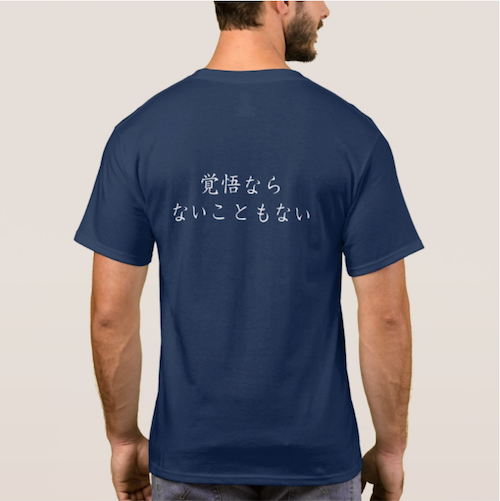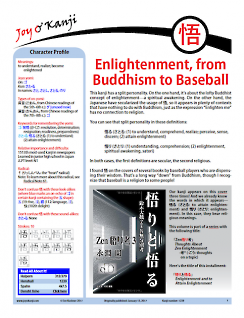悟
to understand, realize; become enlightened
Kanji 1239
Thank you for visiting this Character Home Page. Below you'll find a synopsis of the essay. If you wish to read the full text, the PDF of the essay is available for purchase to the right.
Do you know how to talk about preparing for the worst outcome or selling items at a loss? Can you translate the following: "At last he realized that he was mistaken," "I noticed some kind of glint in her eyes," "They were ready to run the risk of being shot by the enemy," and "How can one become enlightened?" Find out about all this and much more, including baseball players' wisdom.
Revision history:
Aug. 18, 2023: p. 7 sidebar: Added a missing word to the commentary.
Aug. 31, 2021:
- p. 2, Etymology Box: Replaced the Henshall etymology with the new one.
- p. 13: Added a link to the Kanshudo games.
Jan. 13, 2017: Originally published.
Want to Own This Kanji?
If you'd like to wear 悟り (さとり: (1) understanding, comprehension; (2) enlightenment, spiritual awakening, satori), click the images to find these women's T-shirts on Zazzle:
You can also find 覚悟 (かくご: preparedness) on the back of this men's shirt, again available on Zazzle:
The phrases come from Soseki's famous novel Kokoro. Both phrases are only partial quotations. Here's what Soseki actually wrote in each case:
Front:
精神的に向上心がないものは馬鹿だといって、何だか私をさも軽薄もののようにやり込めるのです。
Saying that anyone who had no spiritual aspirations was an idiot, he began to attack me for my frivolity.
The partial quotation:
精神的に向上心がないものは馬鹿だ
Anyone who has no spiritual aspirations is an idiot
Back:
すると彼は卒然「覚悟?」と聞きました。そうして私がまだ何とも答えない先に「覚悟、―― 覚悟ならない事もない」と付け加えました。
Then he said suddenly: "Am I prepared ...?" Before I could say anything, he added: "Why not? I can will myself..."
The partial quotation:
覚悟ならないこともない
Why (am I) not prepared? I can will myself.








Comments